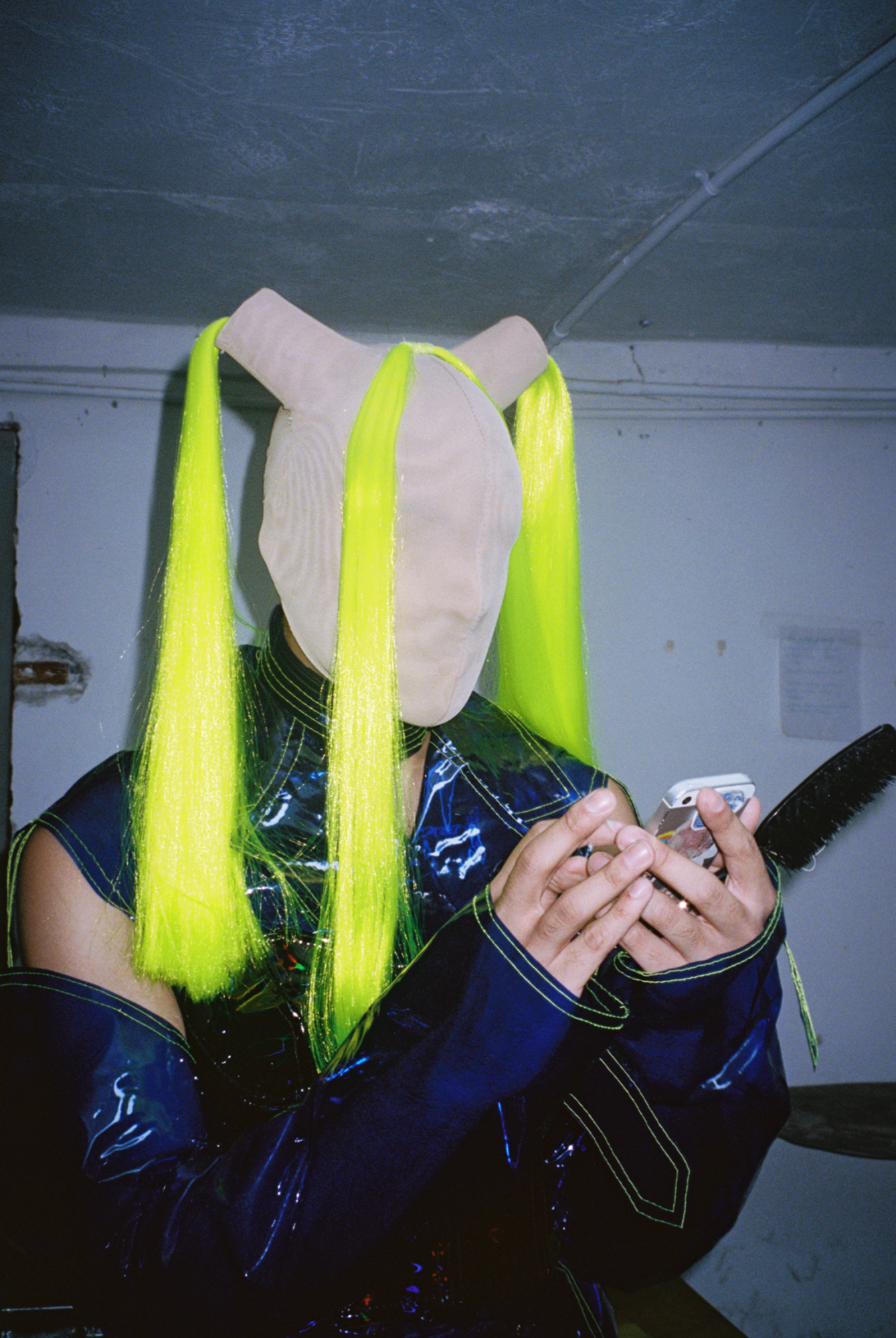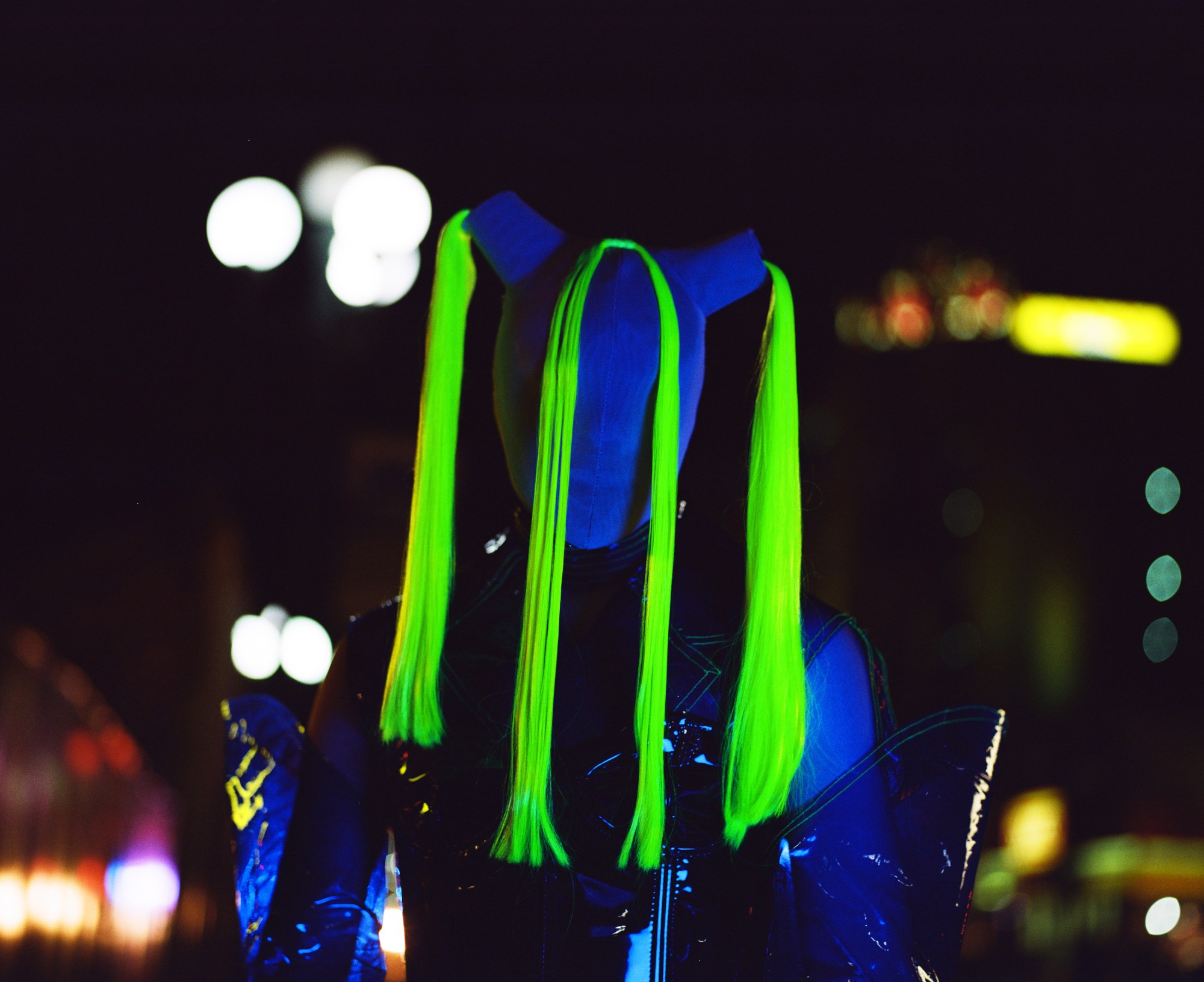On February 15, US President Donald Trump declared a national emergency to bypass Congress and free up billions for a border wall between the US and Mexico. The alleged national emergency? A migrant caravan of several thousand people that arrived at the border fleeing violence in Central America. i-D travelled to Tijuana in December 2018 to report on the situation first-hand. The result was i-D’s latest documentary Tijuana: A Mexican Dream, which you can watch here.
Muxxxe performs live shows in night clubs and music venues, but deep down they prefer doing so on the streets. Out there amidst the pedestrians and chaos of downtown Tijuana, Mexico, they play armed with only a microphone, an amp – strapped to a trolley, blasting fierce rap beats – and their voice.
You can never predict what is going to happen. Some people stop, entranced by this faceless rapper dressed in shiny black leather with four outrageously long pigtails. Others just whip their phones out and smile. Occasionally, someone will become aggressive and start hurling insults. Muxxxe carries on. “The rush is intense,” they tell me. One time they performed in the middle of a traffic jam, right there on the highway, amidst honking horns and gas fumes.
“It is an anthem urging all of us queer beauties out there, to embrace who we are and who we decided to be.”
To perform alone on the streets of Tijuana at night as a third gender rapper is incredibly brave; this is a city with one of the highest murder rates in the world, one that continued to rise throughout 2018. But that’s the kind of artist Muxxxe is: a gutsy disrupter, someone willing to confront accepted realities and create something a little different.
The single, ‘Chula‘, is a dark reggaeton track about every time someone made Muxxxe feel unwanted or unattractive because of how they’ve decided to live their life, and kinda sounds like if Die Antwoord and Major Lazer made a tune together. “It is an anthem,” says Muxxxe, “urging all of us queer beauties out there, to embrace who we are and who we decided to be.” Other songs are just straight up party tracks that make your knees quiver, like ‘Yamamoto‘. “That’s my Britney Spears in toxic fantasy,” says Muxxxe, “an homage to bad bitches and fashion.”
The name ‘Muxxxe’ is inspired by the fact that they identify as a third gender. “When I was a kid,” they explain, “I randomly saw a documentary on National Geographic, and they were talking about muxe culture.” The term muxe is used in Zapotec cultures of Oaxaca (southern Mexico) to describe individuals who are assigned male at birth but have chosen to dress and behave in ways associated with the female gender. Some muxe marry women and have children, while others choose men as sexual or romantic partners. Transphobia is rare in Zapotec culture, and muxe have faced far less hostility in Oaxaca than LGBT individuals would in other parts of the country. It is a celebrated facet of Zapotec history.

“I had already been questioning myself at a very young age – about gender, identity and sexuality,” says Muxxxe, “and when I saw that film it started to make sense, I started connecting the dots. I think the fact that it was something happening inside my home country too, and the whole concept of the third gender… They were the things that really stuck in my mind for all of these years because I could relate to that.”
When I ask if the violent reputation of their hometown of Tijuana is something that worries them, Muxxxe dismisses my question: “I’m used to it,” they say, “shit happens everywhere all the time. I think the media always add so much more than what is really happening.” To anyone who has never been to Tijuana, Muxxxe says come on over and have your own experience. “Have you ever found yourself in danger?” I say. “Never,” says Muxxxe.
“Not having a face allows me to be whoever and whatever I want.”
In fact, in the last few years, Tijuana’s queer scene has blossomed across the city. Muxxxe is part of La Sagrada Familia, a collective of dissident artists who express themselves through the intersection of party and art-action. Through performances, club nights and art in unconventional spaces, they are creating a culture that reflects the diverse ambiguity of Tijuana. “We have started ‘the new wave’ of queer performers in the city,” Muxxxe says.
For now, Muxxxe is finishing off their debut EP, planning a tour and promises a year of “rad collaborations.” When I ask what the live shows are like, they say, “come see me next time.”
“One last question,” I say, “what made you choose to cover your face?”
“I think that when we see people’s faces, we automatically start recognising male or female features,” says Muxxxe, “and that can affect the way we perceive and relate to them. As a third gender, it is important to be as neutral as possible. Especially in this particular time we live in, where everyone is obsessed with beauty. Not just ‘mainstream’ beauty standards; there’s also an obsession with ‘the underground’, where everyone looks exactly the same, everybody wants to identify as something, especially through social media. Not having a face and not being recognised as something allows me to be whatever I want.”
If you would like to help or find out more about the crisis in Tijuana please visit: www.borderangels.org
